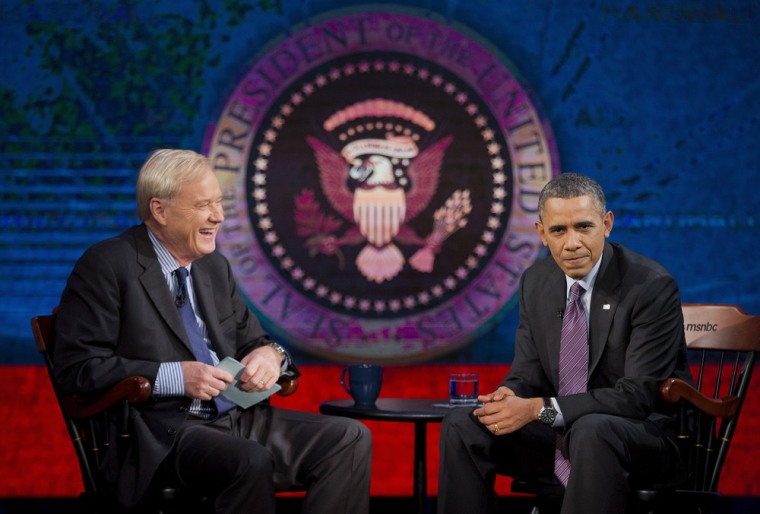Republicans ought to be “embarrassed” of their record low productivity during their time in charge of the House of Representatives, President Barack Obama said Thursday.
In an interview with MSNBC’s Chris Matthews, the president said Republicans shouldered most of the blame for gridlock in Washington, especially as GOP lawmakers tend to the ideological concerns of their party’s conservative flank.
“They’ve got to be embarrassed,” the president said on a special edition of “Hardball” that aired Thursday evening. “Because the truth of the matter is they’ve now been in charge of the House of Representatives – one branch or one chamber in one branch of government – for a couple of years now. They just don’t have a lot to show for it.”
As the White House works to move past a rocky few weeks in which Republicans seized upon the troubled launch of key portions of Obama’s signature health reform law, the president has pivoted to highlight inaction on Capitol Hill.
Obama has spent much of this week hammering Republicans in Congress for failing to take action on his agenda – or worse, even proposing a viable alternative.
“So the problem is not, generally speaking, on the Democratic side. And obviously I’m partisan here, but objectively, I think you can look at it and you can say that the big challenge we’ve got is you’ve got a faction of the Republican Party that sees compromise as a dirty word, that has moved so far to the right that it would be difficult for Ronald Reagan to win the nomination for the Republican Party at this point,” Obama said of the slow pace of legislating. “And as a consequence, it is more challenging.”
Republicans have sought to respond this week by highlighting the 150-some bills they have passed (ranging from repealing health care reform to tax cuts to other GOP priorities) which have languished in the Democratic-held Senate.
“Republicans continue to focus on strengthening the economy for middle-class families. That's why we've passed nearly 150 bills in this Congress. Many of them would help our economy. They're still sitting in the United States Senate,” House Speaker John Boehner, R-Ohio, said at his weekly press conference on Thursday morning. “Senate Democrats and the president continue to stand in the way of America's priorities.”
The question of gridlock and the specter of a “do-nothing Congress” label is already emerging as a potential story line in next November’s congressional elections. Republicans are looking to defend their slight majority in the House and pick up a net of six seats in the Senate to retake control of the upper chamber from Democrats.
Republicans have held control of the House since the 2010 elections, while Democrats won control of the Senate in the 2006 elections and have maintained their majority since then.
Polls testing the so-called “generic ballot” – voters’ preference of a generic Republican candidate versus a generic Democratic candidate – have fluctuated throughout the fall. Democrats took an advantage amid the government shutdown in October, though Republicans have been resurgent in most polls due to the troubled launch of HealthCare.gov and other controversies surrounding Obamacare.
The most recent NBC News/Wall Street Journal poll, conducted at the end of October, found that 45 percent of Americans would prefer a Democratic-controlled Congress as a result of the 2014 elections, while 41 percent want Republicans in charge of Congress.
Frustration with Congress is also broadly reflected in most recent polls, too. And Obama hinted that voters next fall who are frustrated with the state of business in Washington should make the most of the opportunity to shuffle the makeup in Congress.
“We go through these periods where our politics gets all bollocksed up,” Obama said. “But we get through it. The reason we get through it is, ultimately, the American people have pretty good instincts. And if, over and over again, they see that we’re not addressing the core problems that we have, eventually they will put in place people that are serious about getting the work done.”
Obama also hinted at his preference for Democratic control of Congress, which he enjoyed during the first two years of his first term. The president said it’s been when one party controls Congress, throughout history, that the most progress is made in Washington.
“In our history, usually when we’ve made big progress on issues, it actually has been when one party controlled the government for a period of time,” he said. “The big strides we made in the New Deal, the big strides we made with the Great Society – those were times when you had a big majority.”
